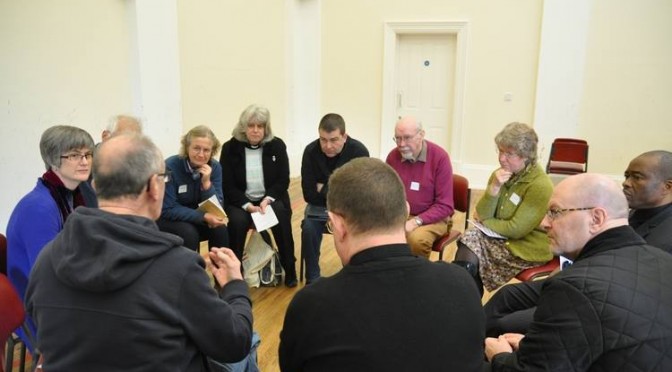
Laudato Si’: Ecumenical Study Day in York
“A Call to Care: Responding to the Challenge of Pope Francis’s Encyclical Laudato Si'” was held at York’s Central Methodist Church on 24th February 2016. The event was organised for clergy and laity of the Roman Catholic Diocese of Middlesbrough, the Anglican Diocese of York, and the York and Hull District of the Methodist Church, and Carmelite friars, sisters and laity were among the 150 or so participants.
The study day was a unique opportunity for Christians of different denominations to reflect on Pope Francis’s challenging document Laudato Si’: On Care for our Common Home, examining the environmental crisis alongside concern for the poorest people of the world. The Pope’s encyclical letter has made a considerable impact on Christians of different denominations, and people of good will concerned by social and environmental issues such as climate change, fair access to water, loss of biodiversity, global inequality, deforestation, soil degradation, pollution of the oceans, and new biological technologies. In his document Pope Francis offers a timely review of current scientific understanding, a theological consideration of creation, and proposes courses of action to promote the common good.
The day began with words of welcome from church leaders, and an act of worship
Key points from the Pope’s encyclical were presented by David Clough, a Methodist Local Preacher who is Professor of Theological Ethics at the University of Chester, and President of the Society for the Study of Christian Ethics.
The first session considered paragraphs 17-52 of the Pope’s encyclical, under the heading “Our Sister, Mother Earth … now cries out to us.” Professor Clough spoke about the broad range of topics Pope Francis addresses in his ground-breaking document, which links together care for the environment with care for one another, especially the poor.
Participants then divided into small groups to ponder the following questions: What do you find especially striking or surprising in the encyclical’s account of the ecological crisis? How successful have the churches been in engaging their congregations with this challenge? What obstacles stand in the way of the churches hearing this challenge and responding to it?
The second session pondered paragraphs 65-100 of the encyclical; under the heading “The entire material universe speaks of God’s love”. Professor Clough described one of the major impacts of the document being to challenge an anthropocentric world view, that is, seeing human beings as the central or most important species on the planet. He also suggested that a major omission from the document is a consideration of the welfare of farmed animals and the carbon/water footprints of farming, and described his own work with the CreatureKind movement.
Participants again broke into small groups for conversation together, pondering whether the Pope’s theology of creation was a vision widely shared within the churches.
After lunch the third and final input from Professor Clough, on paragraphs 202-246 of the encyclical, moved to a practical consideration of what churches should do to address the ecological crises facing the world.
In small groups participants shared what their congregations are already doing in response to the ecological crisis. Participants were asked to consider what new actions might be undertaken for an ecological and community conversion. A wide range of suggestions were put forward, such as: an ecological audit of every church and religious group; fitting solar panels and water butts on church properties where possible; using World Environment Day on 5th June as a chance to preach on the issues raised by Pope Francis; setting up car pools for parishioners to share transport to church; including care for God’s creation as part of confirmation classes and ministerial training; signing-up to an ecumenical covenant of care for the planet; promoting Fairtrade; and developing community gardens and wildlife spaces.
The day ended with a reflection by senior clergy, and an act of worship.
The event was highly informative, enjoyable, and inspiring. The challenge will now be to help parishes, communities and individuals to make the changes necessary to better care for our common home.
Mr.Johan Bergström-Allen,T.O.C.
Communications & Outreach Manager, British Province of Carmelites
Carmelite Communications & Outreach Office (incorporating Saint Albert’s Press)
Whitefriars, More House, Heslington, York, YO10 5DX, United Kingdom



